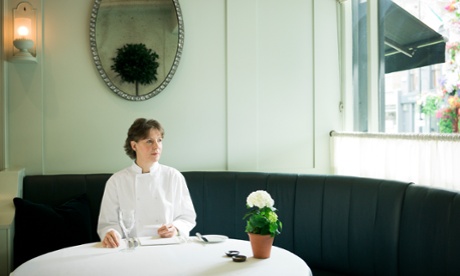
Sally Clarke believes she could live on fennel, crab and apricots alone. But since a collection of recipes using only those ingredients might have seemed a bit odd, she cast her net a little wider for her new book. Thirty Ingredients – the number marks the 30th birthday of her quietly influential restaurant, Clarke’s, in Notting Hill – does what it says on the tin. Fennel, crab and her beloved apricots do star, but alongside many other seasonal delights: blood oranges and broad beans, leeks and landcress, sage and sweetcorn. Like Clarke herself, whose reputation was built on her disdain for fads and faffing, it’s an uncompromising, unflashy kind of a book, its recipes straightforward and rather brief: haikus of deliciousness almost anyone could pull off. In the Clarke’s dining room – lunch service has just drawn to an elegant close – she smooths a tablecloth with her hands, as if it were pastry about to be rolled. “Yes, they’re as simple as possible,” she says. “Because who wants to have to rush out and buy something of which they need just a pinch? Here, we don’t sous vide. We don’t puree things and pass them through multiple sieves. We just buy well, prepare with care, and cook with a minimal amount of intrusion.”
It amazes her that the restaurant is more than 30 years old. “When I first opened, I thought: OK, I’ll just run this little dive among all the antique shops for a while, and then I’ll buy a place in the country with a garden and a few rooms, and open Wednesday to Saturday. Yet here I am, working harder than ever.”
During term time, when her teenage son, Samuel, is away at school, she works from seven until late most days (as well as the restaurant, she also runs a deli and a successful commercial bakery), though her manner is rarely harried: she feels no pressure to respond to trends. “We take our inspiration from what comes through the door,” she says. “I’m not one to do Mexican one year and Japanese the next. When we first opened, it was more Californian. But then we moved into a more British phase, and that’s where we’ve stayed.” On the menu this lunchtime: Scottish langoustine with lemon mayonnaise, Cornish plaice with grilled courgette, gooseberry fool with crushed meringue.
Clarke’s most important inspiration came, of course, from her friend and mentor Alice Waters, of Chez Panisse in Berkeley. But she knew she wanted to work as a cook even as a Surrey schoolgirl. “We always had good food at home, though never extravagant. My mother was more keen on the garden than the kitchen, and that was where I came in. She would hand me Elizabeth David and say: this is what we’ve got, get on with it. I’d cook Sunday lunch while my family were all playing golf.”
After catering college in Croydon and a stint at Cordon Bleu in Paris, she was still uncertain as to how, exactly, she would make food her living. But then, in 1979, she travelled to California, ate at Chez Panisse, and “the pieces of the jigsaw came together”. Can she remember the first dish she tasted there? “A lentil salad dressed with herbs, oil and lemon zest, with goat’s cheese crumbled into it. I thought: this is what I’ve been talking about.” She came back to London, found a site, and with loans from her father and the bank, and some cool-headed advice from the restaurateur Peter Langan, she opened Clarke’s.
People thought she was mad to insist on a set menu at dinner time, but she has never regretted her determination on this – even if, more recently, she has begun offering à la carte in the evenings. “It worked for us for a long time. But I’d also made my point, and I did feel that it turned us, in the end, into a special occasion restaurant: I wanted people to call in after the cinema for a bowl of risotto, too.” As part of this move away from a certain kind of formality, the bar room began opening for breakfast, a treat the late Lucian Freud, who painted Clarke’s portrait, famously enjoyed most days. “Yes, every breakfast and many lunches. We do miss him. We respected his privacy: that’s why he came to be so comfortable here, though we treat every customer the same, whether dustman or duchess. People are amazed when they see me in the dining room, taking people’s coats. But my point would be: why wouldn’t I?”
Clarke believes kitchens are less macho than of old, with the result that more women are coming through. But she’s also convinced there are more female chefs out there than people realise. “They’re not the ones that shout or go on the telly. But I’m not interested in television. I’m interested in cooks who take their craft seriously.” Is she going to carry on and on? She laughs, mock-indignant: “I’ve got to – at least until Samuel is old enough to take over.” Any career change will come only in the next life, when she hopes to make it as an opera singer.

